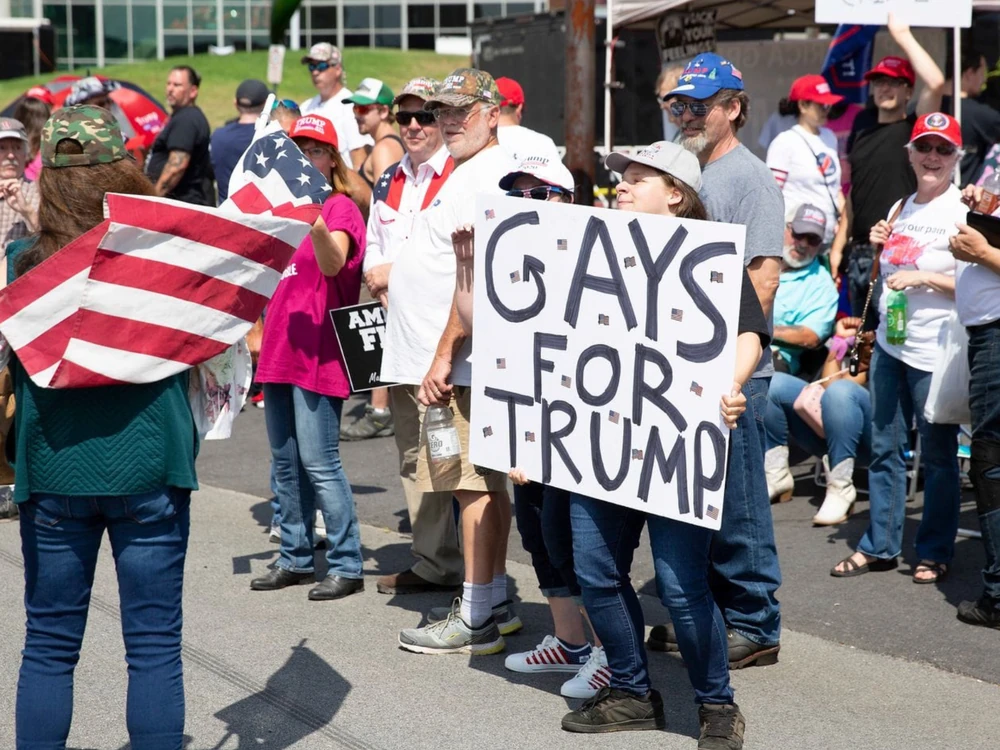The Log Cabin Republicans still exist? Yep! And they love tax cuts more than their community.

In the political realm, some entities linger on the fringes, their presence faint yet persistent. One such entity is the Log Cabin Republicans (LCR), a group often overshadowed but not entirely forgotten. Recently, they’ve resurfaced in conjunction with an unexpected figure: Melania Trump. The former First Lady is slated to headline an LCR fundraiser on April 20th at Mar-a-Lago.
This development raises eyebrows for two reasons: Melania’s reemergence onto the campaign scene and the enduring existence of the Log Cabin Republicans.
Regarding Melania, her post-White House life has been notably low-profile. Absent from her husband’s legal battles and largely absent from the public eye, her sudden return, particularly to a politically charged event, piques interest. Images from a recent fundraiser portray her with an air of reluctance, perhaps indicating her discomfort with the spotlight.
As for the LCR, their continued presence underscores Trump’s pervasive influence within the GOP. Noteworthy hosts of the fundraiser include Richard Grenell, Trump’s former ambassador to Germany, who, despite being openly gay, aligns with right-wing ideologies. Additionally, Bill White and Bryan Eure, a wealthy married couple once aligned with Democratic causes, now stand as hosts, illustrating a shift towards Trumpism among former political opponents.
The history of the LCR reflects a struggle against the rightward drift of the Republican Party. Established in 1977 amidst debates over LGBTQ+ rights, the group initially championed causes like opposing the Briggs initiative in California. However, over time, their focus shifted from advocacy to accommodation, particularly evident in their endorsement of Mitt Romney in 2012, despite his stance against marriage equality.
The trajectory of the LCR mirrors broader trends within the GOP. Formerly dedicated to LGBTQ+ rights, the group evolved into a refuge for affluent individuals attracted to conservative fiscal policies. While some may argue for internal advocacy, the reality is often a far cry from genuine activism, as evidenced by the cocktail-sipping fundraisers attended by members.
In the era of Trump, the LCR’s relevance dwindles further, reduced to a mere facade within the MAGA sphere. Trump’s affinity for wealth shapes his perception of individuals, fostering a symbiotic relationship with affluent LCR members. However, this alliance does not erase the underlying disdain for LGBTQ+ individuals pervasive in Trump’s orbit.
A striking example of this disconnect lies in the appointment of Isabella Riley Moody as an “ambassador” for the LCR. Moody’s history of homophobic remarks and troubling associations underscores the erosion of the LCR’s original mission in favor of aligning with Trumpist rhetoric.
Yet, the LCR’s trajectory mirrors a broader trend within the GOP under Trump’s leadership: a descent into vitriol and division. While a subset of marginalized groups may seek inclusion within the MAGA fold, acceptance remains elusive in a party defined by bigotry and intolerance.
The enigmatic presence of the Log Cabin Republicans (LCR) adds a layer of intrigue to the political landscape. Despite their relatively obscure status, their association with figures like Melania Trump brings them momentarily into the spotlight, prompting questions about their relevance and the paradoxical nature of their existence.
At the heart of this intrigue lies a fundamental confusion: how can LGBTQ+ individuals align themselves with a party and candidates who actively espouse policies detrimental to their well-being? It’s a question that defies easy answers and speaks to the complexities of identity, ideology, and political allegiance.
For many outside observers, the notion of LGBTQ+ individuals supporting politicians who promote anti-LGBTQ+ agendas is baffling. After all, why would a community rally behind leaders who seek to roll back their hard-won rights and protections?
The answer, however complex, often lies in a combination of factors: differing priorities, ideological alignment on non-LGBTQ+ issues, and perhaps a belief in the possibility of change from within. The LCR, for instance, may prioritize fiscal conservatism or foreign policy over LGBTQ+ rights, leading them to support candidates whose views on social issues diverge from their own lived experiences.
Yet, this rationale remains confounding to many, especially those who see it as a betrayal of LGBTQ+ solidarity and progress. How can individuals advocate for their own rights while supporting those who actively work against them?
The phenomenon underscores the nuanced relationship between identity and politics, where allegiance is often shaped by a multitude of factors, including personal beliefs, socioeconomic status, and cultural influences. It also highlights the challenges faced by marginalized communities navigating a political landscape fraught with contradictions and compromises.
As Melania Trump takes the stage at the LCR fundraiser, her presence serves as a stark reminder of these complexities. While some may applaud the LCR’s efforts to engage with influential figures within the GOP, others may question the cost of such alliances and the potential consequences for LGBTQ+ rights.
Ultimately, the enigma of the Log Cabin Republicans persists, embodying the tensions inherent in political identity and the enduring quest for representation and inclusion. As LGBTQ+ individuals navigate a political landscape fraught with uncertainty, the contradictions of their choices serve as a poignant reminder of the complexities of the human experience and the relentless pursuit of equality and justice.
